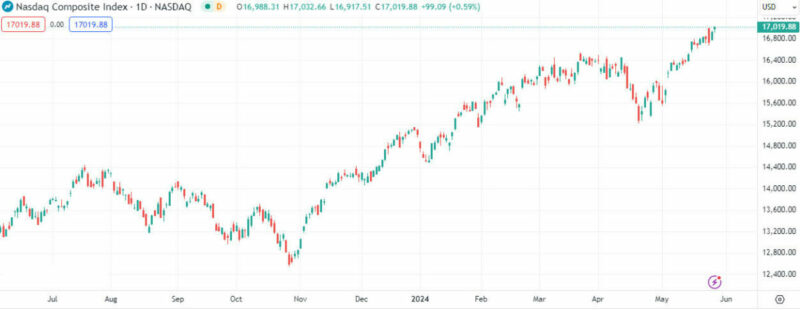The tech-heavy index Nasdaq exceeded 17,000 points for the first time ever as AI leader Nvidia hit a record high which lifted investor sentiment and contributed to the rally. This milestone underscored the ongoing strength in the technology sector and the impact of major players like Nvidia on market movements. Michael James, managing director of equity trading at Wedbush Securities in Los Angeles said:
“In terms of today’s price action, it’s all about technology and the winners continue to be the winners, specifically Nvidia. Today’s tape is a function of positive stories having some stock-specific impact, but overall, as you can see from the Dow being down around 200 points, it’s a generally sloppy overall market session.”

Nvidia Fiscal First-Quarter Report
Nvidia reported fiscal first-quarter results that exceeded Wall Street’s estimates, driven by soaring demand for generative artificial intelligence. This surge led to record data center revenue, highlighting the company’s pivotal role in the AI market and its strong financial performance. It is also important to mention that Nvidia’s continued innovation and release of advanced GPU products attracted more customers and their cutting-edge technology offered superior performance, making them the preferred choice for various industries.
See Related: The first-quarter U.S. Earnings Season Showed Further improvements. What To Expect From The Upcoming Days?
Market attention now turns to the U.S. core Personal Consumption Expenditures Price Index report for April, set to be released later in the week. The Fed’s preferred inflation measure is anticipated to remain stable on a monthly basis but investors will be looking to see if those results will reinforce the changing opinion from the Fed policymakers that there will be no rate cuts in 2024.
Minneapolis Fed President Neel Kashkari stated in an interview with CNBC that the U.S. central bank should hold off on cutting interest rates this year. He also mentioned that the bank might consider raising rates if inflation does not continue to decrease. This situation could negatively affect stock prices, and it is also important to mention that high interest rates make fixed-income investments, such as bonds, more attractive compared to stocks. As a result, investors may shift their money away from stocks, leading to a decrease in stock prices.



